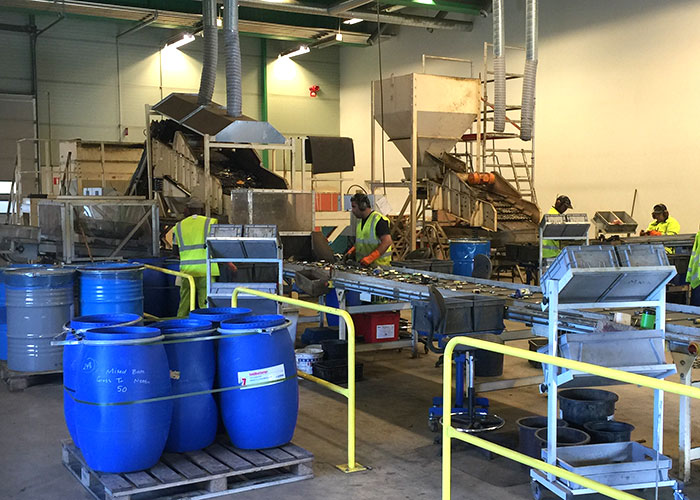Ecosurety and Hubbub have launched a new campaign this October to encourage people to '#BringBackHeavyMetal' found in batteries. But why exactly is battery recycling such a hot topic?
Battery recycling is really important. To put it simply, batteries are extremely harmful to the environment and to human health due to the dangerous chemicals and metals contained within them. If batteries end up in landfill, those toxic substances are leached into the air, the earth and into our water system. Very bad news all round.
What makes batteries so harmful?
Batteries come in a variety of 'types', containing many different combinations of substances. Materials inside batteries can include: lead, nickel, cadmium, mercury, lithium, silver, copper, cobalt and zinc. Some of the most common battery types are lead acid, lithium ion, alkaline, silver oxide, nickel metal hydride and nickel cadmium. Not only are these substances toxic to the environment, there is also a risk of fire caused by lithium ion batteries and a risk to human health from the inhalation or ingestion of the dangerous materials.
Can these materials be recycled and recovered?
Most battery types can be successfully recycled, but the cost of the recycling varies greatly. Ignoring the cost, the valuable metals and harmful chemicals can be retrieved from nearly all battery types for re-use. This not only removes the danger from the environment, but it also reduces the impact of having to extract more raw materials. However for some materials, such as lithium, the cost of recycling the chemicals is greater than the cost of raw material extraction at the moment.
How many batteries are collected for recycling?
Before we can recycle we must collect used batteries, and this is encouraged through the setting of targets. Every year, hundreds of battery producers in the UK are paying money to ensure that a proportion of batteries they place on the market can be collected and recycled. The UK government sets a collection target each year, based on a percentage of all batteries sold, and this target sets a number of tonnes of portable batteries that must be collected and recycled in the UK.
In 2016, the collection target was 45%. This meant that 17,252 tonnes of portable batteries should have been collected and recycled. The UK achieved collection and recycling of 17,233 tonnes – therefore just missing the target. This was a key reason for launching #BringBackHeavyMetal, especially when our research revealed that there are in the region of 178 million used batteries hoarded in UK homes!

A Belmont Trading Limited battery recycling plant
How are batteries recycled?
The actual battery recycling process involves sorting into the different chemistry types, which can either be done using an ‘optical sorter’ - which takes very quick images of the batteries and checks them against an internal database to determine the chemistry type - or by hand. The sorted batteries are then taken to a treatment centre where they are shredded up and the materials separated by various different recovery processes. More about the recycling process can be read here.
Where are batteries recycled?
Right now, only lead acid batteries can be recycled in the UK. All other types of batteries are exported to Europe to be recycled in treatment plants. This comes with a weighty carbon cost as large trucks and lorries are used to transport the batteries to their final recycling destination.
Ecosurety and Belmont Trading UK Limited joined forces over the summer of 2017 to finance the first battery recycling plant in the UK. The operation will begin to fully recycle all batteries types except lead acid (which are already widely recycled in the UK) before the end of 2017, thus reducing the environmental and financial cost of treating batteries, and hopefully enabling the UK to recycle more batteries overall.
How can we reduce the harm of batteries?
Reducing our use of batteries is the best way to reduce the harm they cause. There are many options to reduce our battery use, for example using rechargeables as we do in our phones and computers already. Not only are re-usable batteries better for the environment, but they also result in cost savings. To buy yours, check out our member GP Batteries who are one of worlds largest suppliers of rechargable batteries.
Other ways of reducing battery use include using plug in devices without batteries such as hairdryers and drills, and also using electricals which have other methods of electricity generation built in, such as a solar panel calculator or a wind-up watches and torches.
#BringBackHeavyMetal and win!

However, if you already have used batteries that need recycling – don’t forget to bring back heavy metal! Share the hashtag #BringBackHeavyMetal and post your selfie to be in with the chance of winning a prize of a pack of rechargable batteries. Bringing back heavy metal prevents batteries ending up in landfill, by dropping off your used batteries at battery recycling points. You can locate your closest recycling point here.
Find out more at www.bringbackheavymetal.co.uk

Olivia Green
Key account manager
Olivia joined Ecosurety in October 2014 as a Graduate account specialist. Now, as a key account manager, her role involves working with our members to provide support across all aspects of the company.

Useful links
The quarterly data reveals a total of 25,511 tonnes of portable batteries have so far been placed on the UK market this year, 14,738 of which have been collected and sent for treatment to Approved Battery Treatment Operators (ABTOs) or Exporters (ABEs).
Read More >>Provisional figures, published by the Environment Agency on 28 February, highlight the UK’s failure meet its 45% collection target for household batteries in 2017 – a shortfall of 0.12%.
Read More >>Campaign partner Currys PCWorld to collect used household batteries through network of home installation teams to help combat low recycling rates
Read More >>Latest News

Q2 2024 recycling data shows strong performance in H1
By Sam Marshall 24 Jul 2024
Ecosurety continue to step up for refill and reuse
By Victoria Baker 24 Jun 2024
Ecosurety renews B Corp™ certification with flying colours
By Louise Shellard 11 Jun 2024
